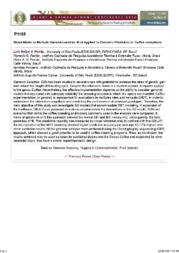Mixed model to multiple havest-location trial applied to genomic prediction in Coffea canephora.
Mixed model to multiple havest-location trial applied to genomic prediction in Coffea canephora.
Author(s): FERRÃO, L. F. V.; FERRÃO, R. G.; FERRAO, M. A. G.; FONSECA, A. F. A. da; GARCIA, A. A. F.
Summary: Genomic Selection (GS) has been studied in several crops with potential to increase the rates of genetic gain and reduce the length of breeding cycle. Despite the relevance, there is a modest number of reports applied to the genus Coffea. Nevertheless, the effective implementation depends on the ability to consider genomic models that represent with adequate reliability the breeding scenario in which the specie are inserted. Coffee experimentation, in general, is represented for evaluations in multiples sites and harvests (MET), in order to understand the interaction magnitude and predicting the performance of untested genotypes. Therefore, the main objective of this study was investigate GS models that accommodate MET modeling. A expansion of the traditional GBLUP was proposed in order to accommodate the interactions in the GS model. Different scenarios that mimic the coffee breeding and models commonly used in the analysis were compared. In terms of goodness of fit this approach showed the lowest AIC and BIC values and, consequently, the best goodness of fit. The predictive capacity was measured by cross-validation and, in contrast with the GBLUP, the incorporation of the MET modeling showed higher predictive accuracy (on average 10-17% higher) and lower prediction errors. All the genomic analysis were performed using the Genotyping-by-sequencing (GBS) approach, which showed a good potential to be used in coffee breeding programs. Thus, as conclusion, the results achieved may be used as basis for additional studies into the Genus Coffea and expanded for other perennial crops, that have a similar experimentation design.
Publication year: 2016
Types of publication: Abstract in annals or event proceedings
Unit: Embrapa Coffee
Keywords: Coffea Canephora, Marker-assisted selection
Observation
Some of Embrapa's publications are published as ePub files. To read them, use or download one of the following free software options to your computer or mobile device. Android: Google Play Books; IOS: iBooks; Windows and Linux: Calibre.
Access other publications
Access the Agricultural Research Database (BDPA) to consult Embrapa's full library collection and records.
Visit Embrapa Bookstore to purchase books and other publications sold by Embrapa.

